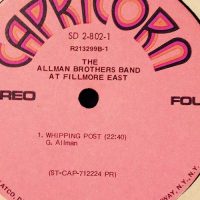You can’t fault Gregg Allman his nostalgia on Low Country Blues. Legendarily restless, he’s still a man, and the leader of a band, that’s been through a great deal. Just as importantly, this record’s hat-tips to blues, R&B, gospel and jazz only underscore how each provided uniquely American spices in the Allman Brothers Band’s bubbling Southern-rock synthesis.
Still, listening to Gregg Allman’s first solo outing since 1997’s Searching for Simplicity, you’re stuck by how much Low Country Blues is haunted by the past, by this aching desire to reconnect. A journey that took Gregg and the Allmans from Macon, Ga., to New York City’s Fillmore East and then to the world, finds him ready to come back home. In keeping, the album is dominated by old tunes by old guys, faithfully done in the old ways.
Yet, Low Country Blues, out Tuesday on Ryko Records, still springs to life, thanks to the memorably haunted howl of Gregg Allman. And nowhere more so than on the initial track, an update of Sleepy John Estes’ “Floating Bridge.”
Opening with a strikingly treadbare croak, Allman sits at the bottom of a muddy river, looking up at family and friends as he struggles for air. After a lonely handful of minutes under water, though, he begins to move back toward the murky light above, with Dr. John’s urgent piano pushing him along. There is more life to live, even as he takes on a greater appreciation for what came before.
Low Country Blues becomes a testament to Allman’s ongoing determination; he, too, seems forever changed by similar near-death experiences. Almost 40 years after losing his brother, Allman Brothers Band founder Duane, in a motorcycle accident back home in Macon, Gregg faced dire health concerns. A liver transplant over the summer eventually saved Gregg Allman, who had struggled through the mid-1990s with a drug habit. He’d also suffered the 2002 passing of Tom Dowd, the legendary producer who helped fashion a Rock and Roll Hall of Fame career.
The only place left to turn, perhaps, was to the beginning. “I Believe I’ll Go Back,” again featuring the antique austerity so closely associated these days with producer T Bone Burnett, might have made a better title track. Either way, it carries over into a rare and intriguing series of introspective moments from an artist not known for such things.
Junior Wells’ “Little by Little” sounds like a lost soul side from the 1950s, while B.B. King’s “Please Accept My Love” has the echoing passion of that era’s best swamp pop. Allman tries out a Stax-ish R&B persona on Bobby Bland’s “Blind Man,” then goes further back on Skip James’ “Devil Got My Woman” to a pre-war acoustic blues — revealing the lively intellect of guitarist Doyle Bramhall II once more.
Over this, the heart of the album, there is a palpable sense of catharsis for Gregg Allman — who, talking about his singing yesterday on “CBS News Sunday Morning,” said: “It’s like going to an analyst and just spilling your guts. You’re getting something off your chest: ‘Look, here’s the way it is.'”
The backing group on Low Country Blues is rounded out by Burnett stalwarts Dennis Crouch, on old-timey standup bass; and drummer Jay Bellerose — both of whom appeared on Robert Plant and Alison Krauss’s multiple Grammy-winning Raising Sand. Together, they gird Allman as he gathers strength. By the time he tackles Amos Milburn’s hardy soul classic “Tears, Tears, Tears,” Gregg Allman has recaptured the shanty-shaking, soul-rending power of his own voice.
That makes sense. Even amidst their initial breakthrough, and perhaps still crowning artistic achievement, on Live at the Fillmore East, the Allman Brothers Band stopped for a nod toward tradition, famously refashioning Howlin’ Wolf’s “Killing Floor.”
Low Country Blues, however, risked becoming just another dusty conversation piece if not for an occasional reemergence of the archetypical Gregg Allman — a risktaker, always traveling, eyes on the horizon. Thankfully, we find an appropriately fidgety edge to Muddy Waters’ “I Can’t Be Satisfied,” as Allman drills into a Chess-era groove. The new “Just Another Rider,” co-written with longtime Allman Brothers Band member Warren Haynes, then unfolds as a second chapter in Gregg’s epic “Midnight Rider,” a No. 19 hit in 1974.
Finally, there’s the album-closing “Rolling Stone,” this chilling old blues set to an ominous prison-detail rhythm. A spurned partner waves goodbye as her lost love’s train disappears into the wide open: “The last time I seen her, she was standing in the station, crying,” Allman sings — as if he was feeling everything and, somehow, nothing.
“I looked out the window,” he adds, “as far as I could see.”
It’s like being shaken awake out of a dream. You knew Gregg Allman wouldn’t stick around for long. That’s the magic, and the melancholy, of this record.
- Nick DeRiso’s Best of 2015 (Rock + Pop): Death Cab for Cutie, Joe Jackson, Toto + Others - January 18, 2016
- Nick DeRiso’s Best of 2015 (Blues, Jazz + R&B): Boz Scaggs, Gavin Harrison, Alabama Shakes - January 10, 2016
- Nick DeRiso’s Best of 2015 (Reissues + Live): John Oates, Led Zeppelin, Yes, Faces + others - January 7, 2016


